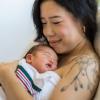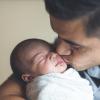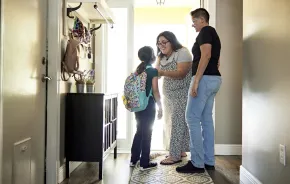
Every year as the cherry blossoms bloom, my heart surges while pondering poetry. There’s good reason for this: April is National Poetry Month. For the uninitiated, this month-long word-love fest established by the Academy of American Poets (AAP) in 1996 proclaims poetry’s awesomeness; it’s also the world’s largest literary celebration, according to the AAP.
On a micro level, this is why local April event calendars contain a plethora of poetry-themed events. On the roster for some of those events: Angel Gardner, Seattle’s Youth Poet Laureate (YPL) with Seattle Arts & Lectures.
I read about Gardner’s coronation last June. The then-19-year-old lived in transitional housing after a two-year stint of homelessness that followed nearly 30 foster care placements; she was removed from her parents’ care at age 5, says The Seattle Times. Gardner, who dropped out of high school at age 17, used her poetry-writing skills and won her a year-long appointment as our city’s YPL. The award includes publication of a poetry chapbook with New York City’s Penmanship Books.
I recently spoke with this now 20-year-old about being life as a YPL and as a new mother (Gardner has a 6-month-old son). Here’s what she had to say about what poetry means to her, her adjustment to motherhood and the best parts of being a famous poet in a city that adores the written word. (And poetry fans, note that the new YPL will be announced at the Northwest Folklife Festival on Saturday, May 27!)
Poetry at Seattle Arts & LecturesSaturday, April 8, at 2 p.m. at Central Library Youth Poet Laureate Angel Gardner, civic poet Claudia Castro Luna and friends share poems. Wednesday, April 26, at 7:30 p.m. at the Sorrento Hotel The Seattle Arts & Lectures Writers in the Schools resident writers read their works-in-progress. Tuesday, May 2, at 7:30 p.m. at McCaw Hall Poet and Everett native Carl Phillips reads from his work. All month Writers in the Schools and Children’s Hospital Broadside poems, a project of local writers and WITS teachers Serra Nelson and Ann Teplick, will be on display at the Jack Straw Cultural Center and Open Books. |
When did you start writing poetry?
I started writing poetry when I was 7. When I started writing, I didn’t think I’d get too far with it. My process has always been when I was feeling a little down, I’d write. I didn’t really read a lot of poetry. I came to it through writing it.
At age 11 and a half, I did a workshop with Pongo for the first time, and I have been involved with them ever since. [Editor’s note: The Pongo Publishing Teen Writing Project works with “Seattle teens who are in jail, on the streets or in other ways leading difficult lives.”] The people who run Pongo are like an uncle and brother to me [Richard Gold and Eli Hastings]. They have nurtured me and been like a second family to me. They told me about Youth Poet Laureate.
What’s the best part of being a Seattle YPL?
It’s been really, really fun. I’ve enjoyed it a lot. It’s helped me a lot with my writing. My favorite part is doing the workshops at camps and schools. I’ve been working with a lot of different poets. I’ve done a podcast with Sherman Alexie and Jess Walter and I did an event with [poet and a Seattle Mayoral candidate] Nikkita Oliver at the Bellevue Art Walk.
What’s the easiest part about teaching poetry to kids? The hardest?
I found that nothing was easy about it so far! I’m naturally an anxious person; reading my poetry is a struggle for me. [Still] yesterday at Tahoma High School [in Tacoma] the students embraced my awkwardness. I’ve been able to be myself when teaching. It’s been really cool to do that.
I’m really young. It’s weird to teach people the same age as me or people that are older than me. I usually tell people not to overthink it — just get the words on paper and not judge yourself. I have my ideas of poetry, and you have your ideas of what you think works. It’s best to get out of your own way.
As a poetry teacher, I’ve found poetry can be a hard sell. How do you sell it?
For the main part, people have asked me to come teach so I don’t have to teach people who don’t want [to hear about it]. I tell them that when I started writing poetry originally, it was my coping skill. It still is my coping skill. Some people like music or sports or what not. Mine’s definitely music, too, but writing’s a big part of my life.
Tell me about your son. What’s the adjustment to parenthood been like for you?
It’s been crazy and difficult, but it’s also been really good. My sister helps me out with everything … She makes [parenting] a lot easier. I’ve found that I can never focus on one thing. When I try to write, I end up looking at him, saying ‘Ah, you’re so perfect. Write the poem!’
Oh my god, I love him so much! He’s so great.
What about writing about your son and the experience of mothering?
It’s exactly how everything is: I can’t focus on one thing. When I try to write about him, you know, I just keep looking at him. But when I do write a poem, it’s nice to know that I’m leaving something behind specifically for him. It’s kind of helped a lot.
Are you still living in transitional housing? What does your life look like now?
I moved into an apartment after [I became Seattle’s YPL]. I work at The Mockingbird Society, working with previous and/or current homeless and foster youth. Together we learn how to be our own best advocates and we also have opportunities to teach other youth that have also experienced these things.
What’s been your favorite events?
My favorite event was Writers Resist. It was a very moving and powerful event and the message was great. It was very cool to see all of the different poets, authors and teachers. I was the youngest reader and I didn’t rehearse. I was the first poet and I read in front of 950 people. I was very terrified; it was pretty nerve-wracking.
I also loved being part of The United Way’s annual breakfast that was at Safeco Field. I got to speak at the education breakfast and it was the first time I read my poetry off of a teleprompter. I love United Way. They’ve been so nice to me and my son; they’re just great people.
What’s it like to be working on a poetry chapbook for publication?
It’s been cray, cray, cray. It’s been really great. Editing it has been [both] fun and extremely frustrating. I didn’t realize that during the editing process, the poems [have to be edited so that they] make sense to everybody. I’m a natural writer, and I write for me to understand. But I learned in the editing process, [the poem] has to make sense to everybody. [The book will be published this year with details available at the Folklife Festival and through Seattle Arts & Lectures.]
What are your plans for the future, for both writing and life?
I’m hoping to get myself to college and get my MFA in creative writing. I want to go into social work first and then get my MFA.











